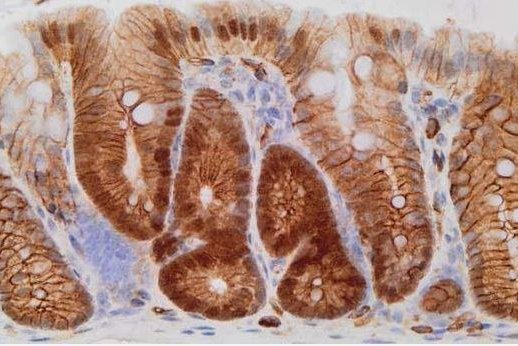Researchers found an antifungal medication commonly prescribed to treat toenail infections helped eliminate dormant cells within bowel tumors in mice. Photo courtesy of Cancer Research UK
June 1 (UPI) -- An antifungal medication commonly prescribed to treat toenail infections helped eliminate dormant cells within bowel tumors in mice.
Researchers at the Cancer Research UK Cambridge Institute found that itraconazole effectively halts the growth and progression of certain types of colorectal cancer. Their findings were published Thursday in the Journal of Experimental Medicine.
"This innovative study has taken a step toward addressing one of the biggest challenges in cancer research," Dr. Greg Hannon, director of the institute, said in a press release. "Tumors are made up of many different types of cancer cells, which can evolve separately and respond to treatments differently."
Colorectal cancer of the colon and rectum is the second leading cancer killer in the United States with 51,651 fatalities in 2014, according to the Centers for Disease Control and Prevention. Also, 139,992 people in the United States were diagnosed with colorectal cancer.
"We've targeted a type of cell that lies asleep within bowel tumors, remaining unresponsive to treatment and putting the patient at risk of their cancer coming back," said co-lead author Simon Buczack, a clinician scientist at the British cancer institute.
These "sleeping" cells are resistant to drugs, including chemotherapy, and can later awaken after treatment has finished and lead to the tumors regrowing.
The researchers characterized the molecular nature of dormant bowel cancer cells, identifying two key pathways* involved in cell dormancy.
They tested different drugs targeting these pathways in mice with bowel tumors.
They found itraconazole blocked signals from a pathway called Wnt, which in involved in the growth and spread of many cancers. With the treatment, dormant cells disappeared and the tumor stopped growing.
"What's interesting is that this drug seems to kick both dormant and non-dormant cells into action," Buczacki said. "It forces cells back into a short cycle of growth before slamming on an irreversible 'stop' button, entering a permanent standstill that's known as senescence."
The researchers hope to set up a clinical trial to test the drug on humans with advanced bowel cancer. They also want to know whether the drug could be more effective with other treatments, including chemotherapy.
"The presence of drug-resistant, dormant tumor cells is a problem in many types of cancer," Hannon said. "If we find ways to target these cells in bowel cancer, it might provide insights into tackling the problem of dormant tumor cells more broadly."
On Wednesday, American Cancer Society changed its recommendation for colorectal cancer screenings, saying adults should begin them at age 45 -- not 50, as previously advised.















